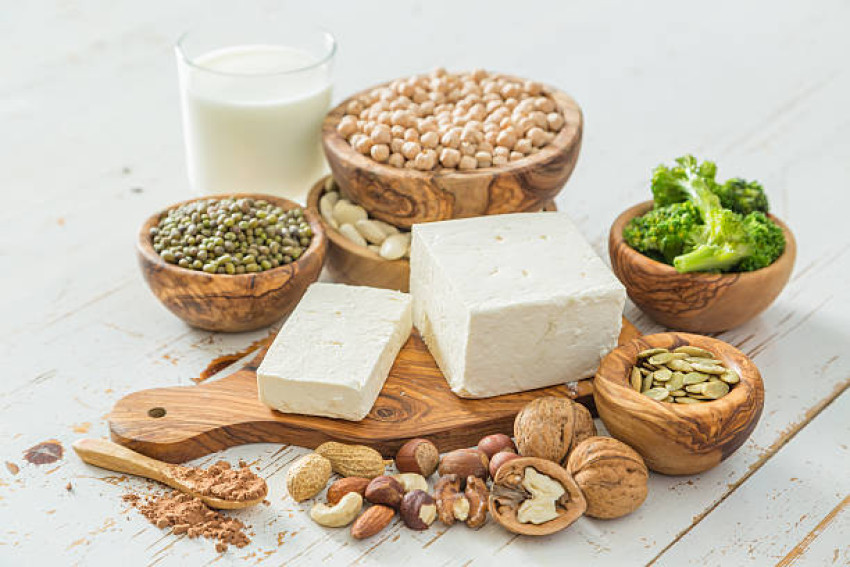
The 22 naturally occurring amino acids that make up protein, also referred to as the protein's building blocks, are broken down into protein-rich foods. Nine are essential amino acids, meaning our bodies cannot produce them independently and must be obtained from food instead. As a vegan, it becomes difficult to include all these amino acids to provide optimum nutrition.
For assistance in preparing a healthy diet, we've compiled a list of the top 10 vegans and vegetarians below:
Tofu, tempeh, and edamame
All three soybean-based foods—tofu, tempeh, and edamame—are particularly well-liked in East Asian cuisine. Soybeans are regarded as a complete protein source and soy nutrition is very necessary for body. This means they supply your body with all the essential amino acids required.
However, many environmentalists avoid soy consumption as its production generates greenhouse gases contribute to climate change. For them, sustainable soy is a good option. Sustainable soy is produced using reduced-till or no-till, crop rotation, water and nutrient management, precision farming technology, and cover crops.
Chickpeas
Cooked chickpeas are high in protein, with approximately 7.25 g per 12 cups. Additionally, they can be eaten hot or cold, and numerous recipes are available online. They can be added to broths and curries, for example, or roasted in the oven with paprika.
Nutritional yeast
Nutritional yeast is a yeast strain that has been deactivated and is sold in stores as a yellow powder or flakes. It has a cheesy flavor and is commonly used in mashed potatoes and scrambled tofu dishes. This complete source of plant protein contains 8 grams of protein and 3 grams of fiber in half an ounce (16 grams). Fortified nutritional yeast is also high in magnesium, zinc, copper, manganese, and all B vitamins, including B12.
Peanuts
Peanuts are high in protein and healthy fats and may help heart health. They have about 20.5 g of protein per 12 cups. Peanut butter contains 3.6 g of protein per tbsp, making peanut butter sandwiches a nutritious complete protein snack.
Chia seeds
Seeds are low-calorie foods high in fiber and Omega-3 fatty acids, which are healthy for your heart. Chia seeds are a complete protein source, containing 2 g of protein per tablespoon.
Chia seeds can be added to a smoothie, sprinkled on top of plant-based yogurt, or soaked in water or almond milk.
Beans with rice
Rice and beans are both incomplete protein sources. This traditional meal can offer 7 g of protein per cup when consumed together. Try rice and beans as a side dish, or combine rice, beans, and hummus for a savory, protein-rich meal served with Ezekiel bread made from sprouted grains.
Potatoes
Each serving of a large baked potato contains 8 g of protein. Other nutrients, including potassium and vitamin C, are also abundant in potatoes.
For a flavorful snack that is better for you than butter-covered potatoes and ups the protein content, add 2 tablespoons of hummus. About 3 g of protein can be found in two tablespoons of hummus.
Protein-rich vegetables
Protein is present in various vegetables and leafy greens in dark colors. These foods do not provide enough protein when consumed alone to meet daily needs, but a few vegetable snacks can boost protein intake, especially when combined with other protein-rich foods.
Kale provides Two grams of protein per cup.
One medium stalk of broccoli provides approximately 4 g of protein.
Five medium mushrooms provide 3 g of protein.
For a meal high in protein, try a salad of baby greens with some quinoa on top.
Spirulina
These blue-green algae are unquestionably nutritious. Eight grams of complete protein are included in a 2-tablespoon (14-gram) serving, which also provides 95% of your daily copper needs and 22% of your daily iron needs (60Trusted source).
Additionally, spirulina has high levels of magnesium, riboflavin, manganese, and potassium and modest amounts of the majority of the other nutrients your body requires, such as essential fatty acids.
Amaranth and quinoa
Although quinoa and amaranth are frequently referred to as gluten-free or ancient grains, they don't originate from grasses like other cereal grains. They are technically regarded as pseudocereals as a result. Even so, they can be prepared or ground into flours like more well-known grains. Both offer 8–9 grams of complete protein per cooked cup (185 grams).
Conclusion
Protein deficiencies can occur in vegetarians and vegans due to the many protein sources they do not consume. As a result, if you intend to consume plant protein, you must maintain a healthy diet. The protein sources mentioned above can help you maintain a proper protein intake if consumed in sufficient quantities.





